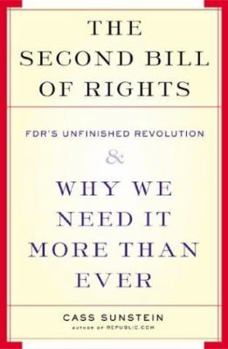The Second Bill of Rights: FDR's Unfinished Revolution and Why We Need It More Than Ever
Select Format
Select Condition 
Book Overview
In 1944, Franklin Delano Roosevelt gave a State of the Union Address that was arguably the greatest political speech of the twentieth century. In it, Roosevelt grappled with the definition of security... This description may be from another edition of this product.
Format:Hardcover
Language:English
ISBN:0465083323
ISBN13:9780465083329
Release Date:June 2004
Publisher:Basic Books (AZ)
Length:294 Pages
Weight:1.28 lbs.
Dimensions:1.1" x 6.5" x 9.5"













